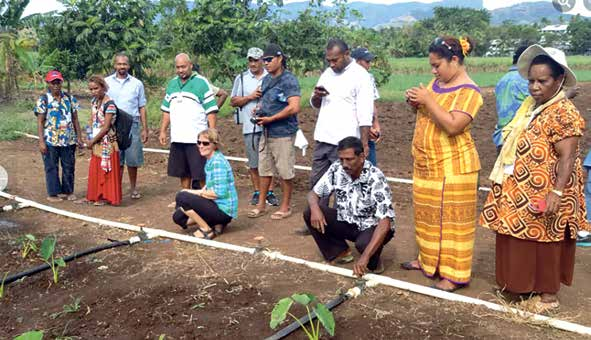
It comes with experience perhaps but having that gifted sixth sense helped immensely in PNG Women in Agriculture Development Foundation (PNGWiASF)’s COVID-19 response.
Months before fresh food markets were to shut down and workers told to stay home, Maria Linibi and the PNGWiADF she leads had begun developing a seed and planting material bank at a five-acre land the government department of agriculture and livestock had donated in Erap, outside Lae city.
This was done around July 2020.
That project, however, was preceded by another one that PNGWiADF organised with leaders of farmer organisations in PNG in December of 2019.
It was a workshop on ICT, aimed at training farming group leaders about using technology like computers, smart phones and the Internet in their work.
Over the two days of training at the Nari Centre in Lae city, 37 leaders learnt about using emails to communicate with their partners and members, as well as posting and managing a Facebook page.
This was actually the second training they have had on being social media savvy, as most of them had attended a workshop on the use of smart phone apps in November 2019.
At that time, COVID-19 was not even known as an illness. “The training exposed farmers to ICT, as some still use simple analogue phones but with this training many are now keen to use smart phones.
“The farmers came from very remote highland areas where mobile communication is available, and were very appreciative of this basic training which opened up the world of communication,” said Linibi, the PNGWiADF President.
Little did anyone know that no sooner afterwards, all those lessons would come in handy when PNG followed the world in closing its international borders and restricting the movement of people due to the COVID-19 pandemic.
Linibi said some of the participants kept in touch with the Foundation during the lockdown by using their smart phones to communicate either via email or on Facebook Messenger.
Reports including photographs have been sent through those social media platforms too.
“We do appreciate that PNG being a country of rugged terrains and high mountains, we feel this ICT training has actually helped our farmer leaders to understand how to use technology.
“And we are encouraging them to get the smart phones so it’d be easier for them to send their reports.
“When we get new funding, we can upgrade them to using an agricultural traceable app.”
Internet connectivity and cost are still a challenge in PNG, even though there’s hope that things will improve with the laying of the new South Sea fiber optic submarine cable linking PNG to Australia and Solomon Islands.
This is something Linibi is looking forward to, because it will save her from the frantic search for Internet signal whenever she is out of her office in Lae City.
“The other day, I was in Erap farm and had an interview with the Australian Women in Agriculture group, and I have to walk a distance of about 20 minutes to go under a rain tree and go on a zoom meeting with them.
“Because I was at Erap, and we have internet issues there.
“Sometimes we don’t get signals at the office there or even at home, so Internet connection is a big issue.”
Apart from connectivity issues, Linibi is hoping costs of Internet will fall once the new cable line comes into operation.
Huge data costs have been a hindrance for farmers’ incursion into the world of the Internet, and PNGWiADF hopes this will be a thing of the past in the not too distant future.
